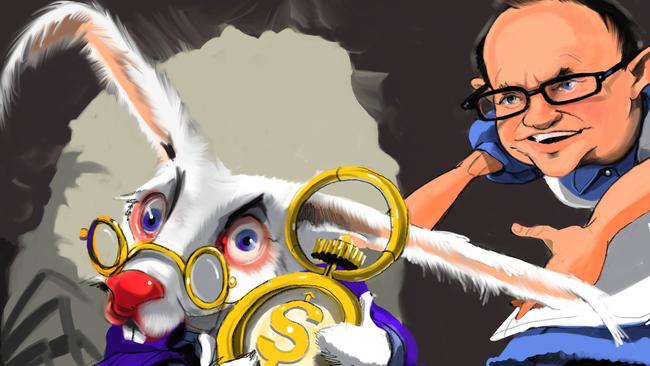
The release of the Greens economic policy inspires nostalgia for the days when greenies spent their days hugging turtles and lungfish. What’s an unbuilt dam or three compared with bulldozing the entire economy?
Today they campaign for a compassionate, caring and fairer society, which is code for taxing, spending and taxing some more.
“To make society more equal we need to pay more tax, starting at the top,” Greens economic spokesman Adam Bandt declared last week, adding the Greens were opposed to any form of tax cuts.
The problem with socialism, Margaret Thatcher famously remarked, is that you eventually run out of other people’s money. Bandt is determined to prove her wrong. Once this generation has been squeezed dry, he’ll move on to the next one by borrowing money it will have to repay one day.
“It’s time to stop treating debt as a four-letter word,” Bandt said. “It’s not whether the budget is in deficit or surplus that matters, it’s the sustainability and justification for the budget position.”
While Scott Morrison loses sleep over the difficulty of containing debt, Bandt wants to borrow even more to fund what he calls “the next Apollo project — making Australia a renewable energy superpower”. Commonwealth net debt is forecast to peak at 18.5 per cent of gross domestic product in the year after next. Bandt wants to increase it to 25 per cent, arguing that “there’s no point in having a triple A rating if you don’t use it”.
Well sort of. Australia retains its privileged ratings status only because it has refrained from borrowing wildly in the manner Bandt suggests. Bandt should heed Lewis Carroll’s warning against chasing white rabbits down holes: “Down went Alice after it, never once considering how in the world she was to get out again.”
He also should consider the plight of Ireland, where in 2007 the gross national debt was 25 per cent of GDP. Then came the global financial crisis, ending a housing boom, pushing the country into recession and forcing a run on the banks. In 2013, gross debt hit 124 per cent of GDP.
If this kind of fiscal fruitiness is part of the mainstream progressive policy Richard Di Natale promised when he became Greens leader a year ago, then we clearly are in trouble. The Greens may be small in number but greenish thinking is pervasive among the professional classes, not least among the opinion formers at the ABC.
If Labor regains power, it almost certainly will be in company with the Greens, formal or informal. Wise heads in the ALP regard the 2013 Gillard-Brown pact as a disaster for the Labor brand but, if anything, the two parties have moved closer philosophically in the intervening years.
The two are now united on a policy of tax and spend; both regard wealth and income inequality as our greatest contemporary moral challenge; and both are committed to gigantic government subsidies to realise their dream of a nation powered by the sun and wind.
Neither party is much concerned with creating wealth but both are consumed with its redistribution. They share the same utopian dream of equality, a society in which there is equal reward for the adventurous and the timid, the industrious and the indolent, and the prudent and the profligate.
All this makes perfect sense to those who live off the public purse within 10km of the CBD.
For those in economic sectors that are obliged to make a profit, however, the modern progressive mindset is utterly perplexing.
Australians have never been comfortable with the politics of envy. The steady rise in affluence in postwar Australia thwarted the Old Left’s attempts to raise proletarian class consciousness. “There is only one great and honourable class distinction in Australia,” Robert Menzies told an audience in Melbourne in 1962, “and that’s the distinction between the industrious and the idle.”
There’s a certain irony in that the Greens should be leading the attacks on the rich since their voters inhabit some of Australia’s wealthiest suburbs. The median income of a family with children in Bandt’s electorate of Melbourne, for example, was $3015 a week in 2011, a third more than the national average. If the levellers’ dream of equality were ever fulfilled their incomes would fall by $700 a week.
But of course the inner-urban compassion-mongers want no such thing.
Their real aim is not the relief of poverty but pumping up the government services that many of them are employed to provide. They want more middle-class welfare in the form of childcare, free health and schools.
For Labor and the Greens to advocate bigger government spending is politically understandable, since the core vote for both parties comes from those who draw a living from the public purse.
Yet there is a vindictive edge to the demonisation of the wealthy. Bashing the rich is no longer about revenue raising; it has become an end in itself. Last week the Greens announced that the temporary deficit levy imposed on high-income earners would stay. On top of that they will impose an extra 5 per cent tax on anyone earning a seven-figure annual salary, a so-called Buffett tax.
Ostensibly, this policy is needed to find money to fund schools and hospitals. But even on the Greens’ figures the revenue is paltry — a mere $4 billion across four years. It is barely enough to pay for the interest on the current debt for four months, let alone the extra $100bn or so we’d be servicing if the Greens get their way.
One senior commentator last week described the Greens’ policy announcement as a “push towards the political centre ground”. Hardly. Rather, it betrays the Greens as sirens of socialism luring Labor ever further towards the Left.
Nick Cater is executive director of the Menzies Research Centre.


